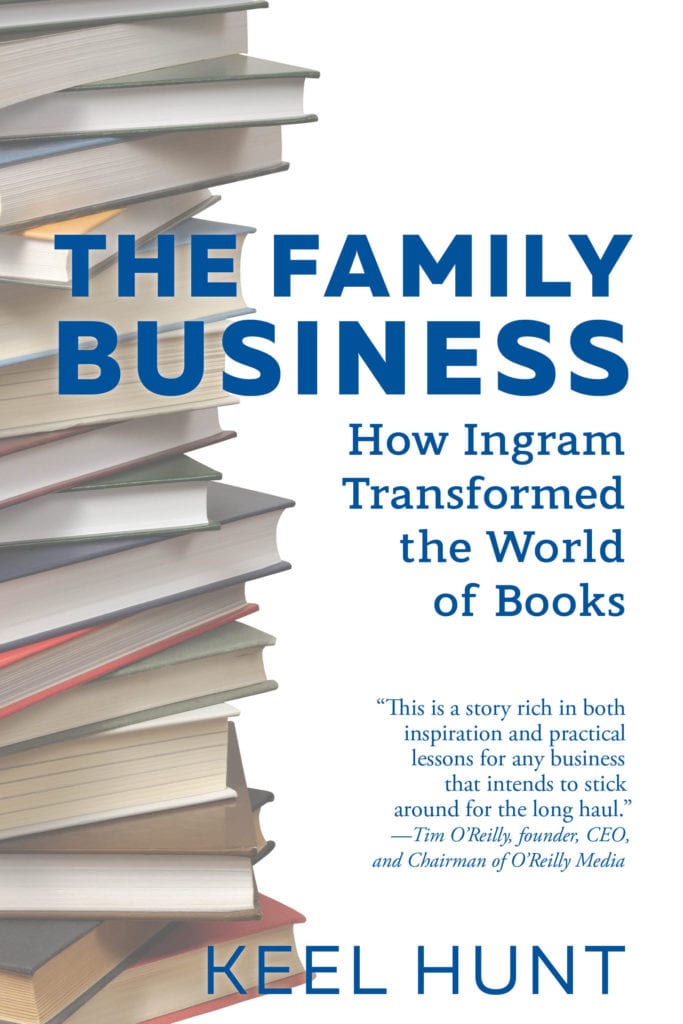|
Getting your Trinity Audio player ready...
|
Ingram Content Group’s fiftieth year of operation has been no ordinary year. In 2020, Ingram Industries, like practically every business, found its usual operations seriously disrupted by the COVID-19 pandemic that was sweeping the world. But the Ingram Content Group discovered that its particular services were in unusually high demand, chiefly because of Ingram’s sophisticated capacity for producing and shipping books (and other products) to distant places, reliably and quickly.
In fact, while much of the world economy was shutting down in the wake of the pandemic, Ingram was running faster than ever to provide goods and services that millions of people and countless institutions relied upon. So how did a tiny, Tennessee-based book wholesaler turn into an international giant with such unique business capabilities?
Family
The story of Ingram Content Group obviously begins with Ingram’s founding family, and the choices and decisions they made along the way over a half-century of growth, struggle, and innovation that has changed an industry.
But there is another family story that has contributed to Ingram’s unique history and place in the book industry. Its leaders have consciously fostered a family spirit among its associates, an all-hands-on-deck ethos of cooperation, and a norm of mutual regard and respect for colleagues, all above and beyond the usual commitment to businesslike performance of tasks and assignments. Today more than four thousand people work at Ingram and participate in its extraordinary corporate culture.
And, more broadly there is the living phenomenon of a family business and all that that means in our broader culture. A family business, whatever its name or business category, is usually a special business. Some endure longer than others. Family members may share the vision behind a successful enterprise, and they may pass its ownership and control down to successive generations, or they may not. And yet the dynamics behind any business owned by any family are always unique to that particular front office. Ingram’s story is one of these, and it represents some of the very best qualities that outstanding family businesses have to offer.
Intrapreneur
The word “intrapreneur,” first coined in a 1978 paper titled “Intra- Corporate Entrepreneurship,” by Gifford Pinchot III and Elizabeth S. Pinchot, describes a business leader who drives the development of innovative products or services from inside an established company. An intrapreneur is able to find and embrace new ideas that the company may, with sufficient focus and capital, transform into the future of the company.
Philip M. Pfeffer, one of John Ingram’s early mentors, likes using the term “intrapreneur.” So it is not surprising that in 1995, when John inherited the book business upon his father’s death, he not only took the family business in new directions but he also brought the spirit of intrapreneurship to new heights within Ingram.
The intrapreneurship driven by John and his team would eventually lead to a sustained period of continued growth and profitability for the family business. But first would come an era of uncertainty and turmoil. Technological change was continuing to accelerate, new forces and players were entering the field, and the structure of the book business was evolving rapidly.
This intrapreneurism was on display when John turned to YS Chi during a tour of the Ingram warehouse and posed the questions that would transform publishing and usher in a new era of print on demand distribution: “Why in the world are we wallpapering the warehouse with all these books? Couldn’t we be storing the content digitally and then printing the books off once they’re ordered?”
Switzerland
Following the bookstore boom of the 1970s, 1980s, and 1990s, the book industry started succumbing to trends toward consolidation amid external pressures from media giants eager to expand their footprints in the industry, big box retailing trends, and, of course, the internet. What started as one of the nation’s more fragmented industries, took several large steps in the direction of consolidation.
Barnes & Noble exerted increasingly competitive pressures on smaller booksellers. Neighborhood bookstores, even ones that had been in business for generations, found it hard to retain their customers when a giant new superstore opened nearby. American literary culture worried about the replacement of thousands of independent bookstores by a seemingly monolithic chain of superstores that, as critics complained, merchandised books in the same way that McDonald’s sold hamburgers.
During these years of conflict, Ingram executives sought to maintain their own company’s neutrality. They repeated the slogan, “Ingram is Switzerland,” reminding their associates that it was never Ingram’s place as a wholesaler to take sides.
Then Amazon began to mount a new threat to independent booksellers. Over time, with its deeply discounted prices for trade books, Amazon began to draw retail business away from the traditional “brick-and-mortar” bookstores.
During this turbulent decade of change in book retailing, Ingram, which supplied all types of bookstores, as well as Amazon, steadfastly remained focused on its own neutrality. Senior Ingram executives in Nashville and La Vergne liked to remind their associates that it was never their company’s place to take sides. “We served all bookstores, from tiny independents to the biggest chains,” former Ingram Book Group CEO Mike Lovett, said, “and, for a time, Ingram played a large part in leveling the retail playing field.”
It’s not possible to foresee in any detail what the next twenty-five or fifty years might bring for this business that has already played a major role in transforming its industry. No one knows that better than John Ingram himself:
“The life of this company has always been more about a journey than a destination, and it has certainly evolved over time. We’ve had twists and turns over our first fifty years, and I expect there will be twists and turns to come. But I am hopeful we will always remain relevant and profitable, known for our excellent team and outstanding service, and always prepared to take advantage of the opportunities that come our way.
“Some might say that Ingram has been lucky. Maybe so. But I believe that luck is the intersection of preparation with opportunity. So I hope we stay lucky, and the next fifty years will take care of itself.”
Keel Hunt is an editorial columnist for The Tennessean and author of Coup: The Day the Democrats Ousted Their Governor and Crossing the Aisle, How Bipartisanship Brought Tennessee to the 21st Century and Could Save America. His new book is The Family Business: How Ingram Transformed the World of Books.




